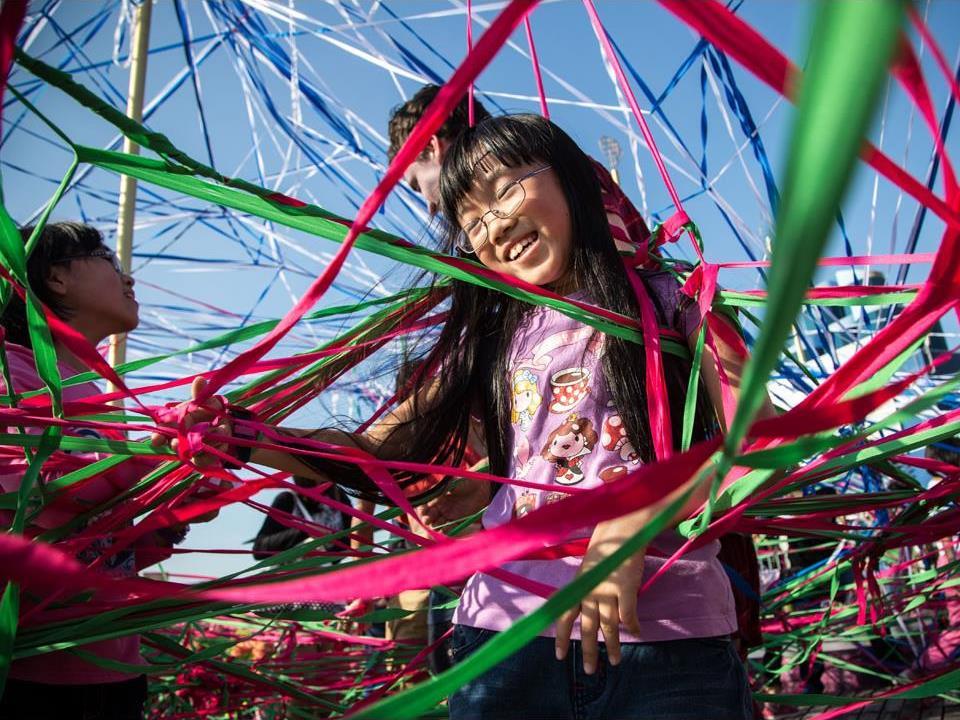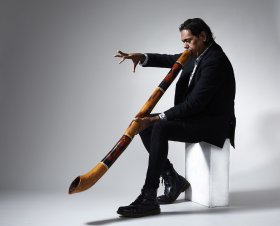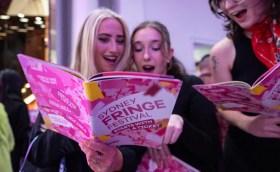Polyglot Theatre’s Tangle, Hong Kong, 2014. Courtesy of Polyglot Theatre.
Touring is an incredible privilege that can extend and transform your practice, but it also demands clear thinking on a host of different artistic, practical, and ethical considerations.
Here’s what you need to know before you even start to think about taking your show overseas.
Why go – and when not to go
‘I never wanted to perform for just a coterie of my friends and ex-lovers,’ says Moira Finucane of avant garde performance company Finucane & Smith. ‘I wanted to take my work to the broadest possible audience, to people who would rather have their teeth pulled out than see feminist performance art.’
That’s why she’s spent much of the last five years working in China and Latin America.
‘The benefits of working internationally are multifaceted,’ says Viv Rosman, executive director of Polyglot Theatre, which has been making interactive and participatory theatre for children and families since 1978. The company’s work is in demand internationally, so touring extends the longevity of Polyglot’s productions and earns income that can be put towards new work and social impact projects.
It’s also an opportunity for learning – about audiences, about doing business internationally, and working across cultures – and for seeing how your work stacks up against your peers, Rosman says. Polyglot typically undertakes four to six international tours each year, as well as maintaining ongoing collaborations with partners in Japan and Indonesia.
For independent artists, Finucane warns that touring rarely breaks even, let alone reaps profit. ‘International touring doesn’t make money … it’s about investing in your future both professionally and artistically,’ she says.
The more open you are, the more you’ll get out of it. ‘If you are not responsive, if you’re not interested in and fascinated by the audience, then the likelihood of that tour contributing to your life as a creator is much smaller,’ Finucane says.
‘It’s not for every work to go everywhere,’ says Nithya Nagarajan, an independent artist and creative producer who has lived and worked in India, Australia, Kuwait and the UK. ‘Artists really need to be able to answer why they need to be seen in a region.
‘Question your motives, check your privilege, and really understand the integrity of both your practice and your relationship to the region. Where is the reciprocity?’
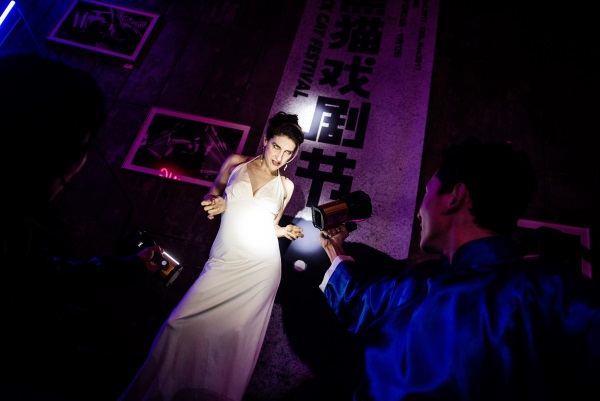
Moira Finucane closes Black Cat Festival, Meng Jinghui’s Beehive Theatre Beijing. Photo courtesy of Studio Meng Jinghui.
How to get started
Rosman advises:
- Know your work and how to talk about it. Why is your work distinctive? And why you want to tour?
- Understand the international context. Who else is making work like yours? Who’s buying such work?
- Get out and about as much as you can – go to national and international markets and festivals. Meet artists and presenters and take the time to learn about their interests.
- Take every opportunity to pitch or present your work – nothing beats experiencing it live and the international arts community is strongly networked. Word travels!
For independent artists, Nagarajan suggests that personal connections can provide more meaningful pathways to touring than marketplace events. ‘The mobility that’s possible because of where Australia is, and through the demographic makeup of Australia with multiple generations of migrants, enables people-to-people links that are rich and built up over time,’ she says.
However, Australian artists from migrant backgrounds are often overlooked both here and overseas, even – or especially – when their work draws from cultural traditions that are familiar to audiences in their intended destination.
‘Particularly if they’re working in forms through traditional rigour or practice or classicism, that aren’t “contemporary” in the way that’s construed in the West, they’re severely disadvantaged here in Australia,’ Nagarajan says, pointing to the lack of critical engagement with non-Western arts practices. ‘And then there they’re seen as inauthentic because their training doesn’t stem from “the homeland”, so they’re disadvantaged on both counts. Really, the Australian side needs to validate them nationally so they can be competitive internationally.’
Finucane encourages artists to be open, bold and opportunistic: ‘Say yes to everything unless you don’t like the idea.’
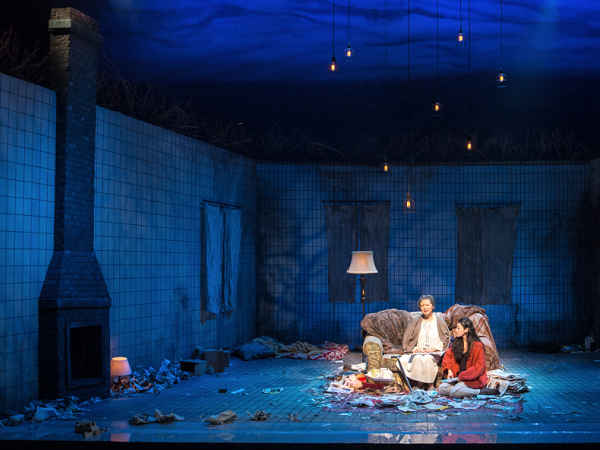
Moira Finucane directed the Chinese production of Jackie Smith’s Australian gothic play The Flood starring Su Li, Mai Ze and Li Bing. Presented by Vertebra Theatre.
Before you get there
‘The logistics are complex!’ warns Rosman. There is a huge amount of detailed information to manage, from visas to lights, and everything must be accurate.
Finucane stresses that you should take production support with you, as no matter how well you’re supported by partners and venues, you can’t expect people who don’t know your work to get what you’re trying to do – especially if it’s outside their norms.
‘With genre-defying work, there’s the “what the fuck” factor. Our technical requirements are different. It’s drama, cabaret, immersive; the fourth wall has gone; so you can’t expect theatre techs who have never seen your work to understand that,’ she says.
You also need to think about how your work will translate in a different cultural context.
‘That sensitivity needs to be tested before taking a work to the region,’ says Nagarajan. ‘If you don’t have the cultural competency, get a producer who does.’
As Rosman stresses: ‘Audience expectations are different everywhere.’ Often, she adds, marketing sets up those expectations: ‘It’s always useful to understand the context your work is being placed in – how much are the tickets, what else is on in the venue or festival you’re going to, what does the flyer actually say about your show?’
One challenge for Polyglot is shifting the mindset that children must learn something from theatre. ‘In many parts of the world, theatre for kids is synonymous with “education,”’ Rosman explains. ‘Getting out of that educational paradigm is something that can take a lot of discussion with our partners and usually requires them to experience our work first-hand.’
Artists should also be mindful of taboos and hierarchies. Who does the talking can be just as important as what is said. ‘If you don’t ask the right person, nothing will happen!’ Rosman says.
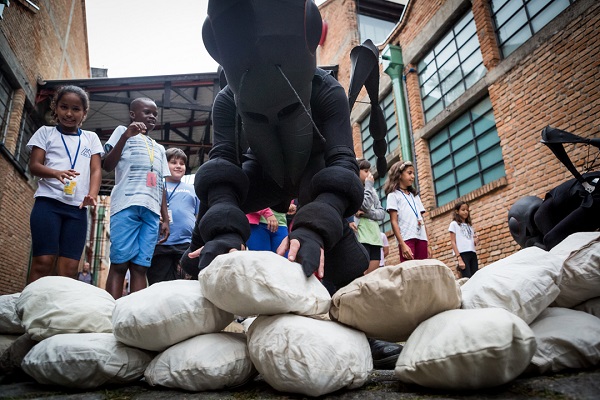
Polyglot Theatre’s Ants, Brazil, 2016. Photo: Matheus Jose Maria. Courtesy of Polyglot Theatre.
Once you land
When you get there, things are likely to change on the fly, and your carefully confirmed plans might fall apart. What you need is respect, resilience, humility and responsiveness.
Finucane stresses the importance of trusting and respecting your international partners – even you don’t know why something is a problem. ‘There are cultural considerations there that you won’t understand, and you will never understand. You don’t need to try to unpack them, you just need to respect and be guided by your partner, because they’re inside the culture.’
You should be prepared for all sorts of last-minute surprises, from equipment issues to scheduling changes. Finucane has directed performances where the timeslot was halved and worked in heritage venues where her team arrived to find broken wiring, dead rats, and nowhere to secure lights. Wherever you find yourself, she advises, you need to say ‘I am here,’ and find a way to make your work and the context sing to each other.
Everywhere, venues, festivals and arts organisations are stretched for resources. Remember that staff are trying to do the best they can with what they have. Sometimes pride, ego and nerves can distract you, Finucane says, but things will quickly head downhill if you start throwing your weight around. Instead, focus on how you can reach your audience.
After you leave
Each tour is an opportunity to build on Polyglot’s collective knowledge for the next one, Rosman says.
It’s worth taking the time to build strong, reciprocal relationships with international partners. Polyglot’s collaboration with Indonesia’s Papermoon has been a decade in the making: the artistic directors met through an Asialink residency 10 years ago and now their co-production, Cerita Anak (Child’s Story) is touring the world.
We need to see that reciprocity on an industry-wide level. ‘Australia often looks to export its artists rather than inviting international artists,’ says Nagarajan. ‘It’s very difficult to expect doors to open if we’re not reciprocating. One of the first things Australia needs to look at is how we invite, engage, and host international artists so that it’s not transactional.’
The same principles apply regardless of whether you’re working offshore or within Australia. ‘Working in China is not so different from working with the Mudbarra people of the Marlinja community,’ Finucane says. ‘Their culture and my culture are so radically different; I need to be respectful of things I don’t even understand. Cultural sensitivity is about unknowingness. It’s not always about knowing what to do. It’s about respecting that you don’t know.’

